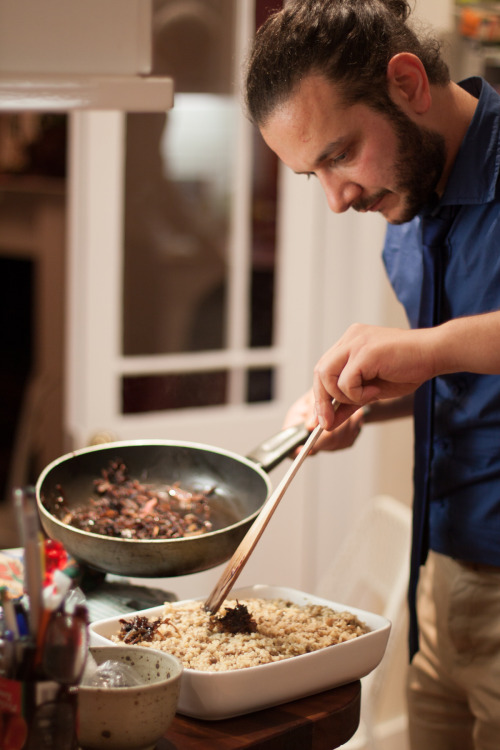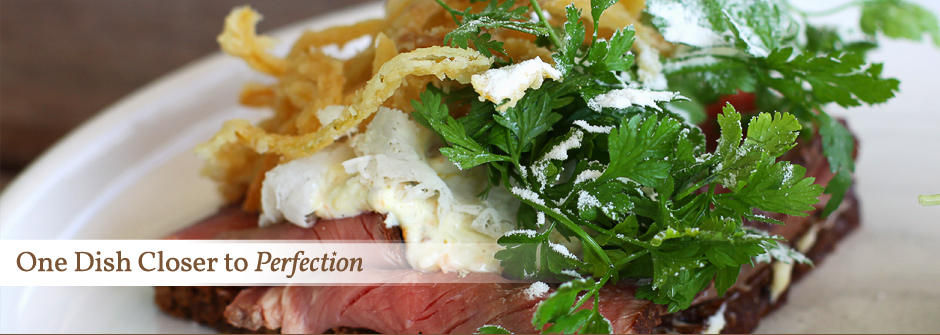#CookforSyria: Bashar's Mugadara
 Saturday, November 12, 2016 at 10:21AM
Saturday, November 12, 2016 at 10:21AM 
One of the most striking things about Bashar is how warm, generous and overwhelmingly positive he is. Without probing – and you do have to probe – you would never know the trauma that he has been through.
Perhaps it is not remarkable – all of the Syrian refugees I met when I visited Calais were equally warm and welcoming. It was their generosity that really struck me though; these people who had so little were so keen to show us hospitality. It was their way of thanking us for the bags of food we brought and the odd jobs my friends did around their makeshift homes.
Khairun Dhala, who runs the Marhabtayn Syrian Supper Club, tells me that “Syrians are very hospitable people”. One of the aims of their supper club is to show people that and “counter the image of refugees being scroungers or just wanting to take benefits.” It’s a friendly space where people can feel welcome, enjoy a good meal and learn a bit about Syrian food and culture.
The supper club raises funds and awareness for individuals who have “fallen off the radar”, who don’t have connections with big NGOs. The funds might be for legal support or healthcare or to rebuild a business that has been destroyed in the war in Syria. This is how I met Bashar. He kindly offered to share this Syrian recipe for me to post on the Borough Market website as part of the #CookforSyria campaign.

Bashar fled from Syria to Lebanon in 2013. As an activist involved in the Syrian revolution, he had been detained twice for a total of 11 months and didn’t feel he would survive the third time: “I always say it’s something very similar to death, to the extent that you feel that death is a solution for that.”
I feel bad about pressing him to tell me more and a few times we stray away from the topic as he becomes uncomfortable, but Khairun, who has been friends with him for a long time, asks the questions I can’t and eventually he tells us both about his experiences in detention:
Detention centres in Syria are torture. There’s a very big number of people in the same room so, for example, in a room like this [about 15m squared] there would be 70-80 men. The essentials, the basics of life, you can’t do them properly – you can’t wash, you can’t eat, you can’t drink, you can’t do anything. Also it’s quite risky – there’s a lot of disease and health problems, of course, with that big number of people and no medical care. That’s in addition to being always questioned, interrogated and all these issues.
The second time Bashar was detained it was simply a case of being in the wrong place at the wrong time. He was at a table with a group of activists and they came to detain one of the others. They took everyone at the table and “when they found out I had what they call a black file for being detained previously that meant they had to keep me again and it cost me like 5 month [sic].” Once you are blacklisted you are no longer safe.

How did he come to be blacklisted? What was he detained for the first time? Having mentioned his role in the ‘revolution’ briefly I am expecting the answer to be guerrilla warfare of some nature. But no, Bashar played his part by attending peaceful protests against the Syrian government and offering medical care for people injured at such events.
How did he get to Lebanon? “I had loads of friends in Lebanon who supported me. We have quite a big Syrian community in Lebanon”. He worked in camps and volunteered with NGOs until he got a job through a friend working with an NGO. However, things are becoming more difficult for Syrians in Lebanon, particularly activists. “I couldn’t stay there, I had some problems with security”.
In March 2015, he came to the UK as part of the Syrian Vulnerable Persons Relocation Scheme, a humanitarian protection programme offered by the UK government. After 17 months in Bradford, he now lives and works in London.
I ask Bashar to share a recipe with me that is special to him, that reminds him of home. He tells me that mugadara is a dish associated with poverty in Syria. He used to complain when his mother made it when he was younger – “Awwwww, mugadara!” – but he came to appreciate it after he left home. He loves it because it is simple, healthy and reflects how Syrians adapted to difficult circumstances. A lot of refugees make it because it is a cheap dish that feeds a lot of people.
It sure does! This recipe serves 6-8 people as a main course.

Ingredients
For the Mugadara
250g brown lentils
500g coarse bulgar wheat
Freshly ground black pepper
Olive oil
2 brown onions, peeled and sliced into half moons
For the accompaniments
1 bunch salad onions
1 bunch mint
1 green pepper
1 red pepper
Handful mild green chillies
1 small cucumber, diced
4 tomatoes, diced
1 carrot, peeled and diced
1 lemon
Olive oil
Handful gherkins
Handful olives
Method
To make the Mugadara, rinse the lentils and put in a large saucepan with cold water. Put over a medium heat and bring to a simmer then reduce the heat to low. Cook for 30 minutes or until tender.
Add the bulgar wheat, stir and top up with cold water until a tablespoon stays up when inserted straight into the lentils and bulgar. Cover and leave to cook until all the water is evaporated. You can check this by inserting a knife, moving it to one side and looking at the bottom of the pan.
When all the water is evaporated, season with plenty of salt and freshly ground black pepper. Add a generous glug or two of olive oil and fry for a few minutes, stirring occasionally.
While the lentils are cooking, fry the onions in a large pan over a low heat with a generous glug of olive oil. Stir occasionally. Cook for at least 30 minutes until caramelised. Put the Mugadara in a large dish and arrange the onions over the top.
To make the accompanying salad, trim the salad onions and slice two into rounds and put in a bowl. Take a few sprigs of mint, finely chop the leaves and add to the bowl. Core and deseed the peppers, slice into 8 or so thick strips. Dice a couple of the strips of both peppers and add to the bowl. Slice 2 green chillies into thin rounds and add to the bowl.
Add the diced cucumber, tomatoes and carrot to the salad bowl. Using a knife remove the peel from half of the lemon, staying close to the skin so there is not too much pith. Finely chop the peel and add to the salad. Dice the flesh of half the lemon, remove the seeds and add to the salad. Add the juice of the other half of the lemon to the salad.
Just before serving the mugaddar, add a generous glug of olive oil to the salad, season with salt and pepper and toss.
Arrange the leftover salad onions, mint, peppers and green chillies on a large plate. Add a handful of gherkins and olives to the plate.
Serve the mugadara with the salad and the plate of vegetables, herbs and pickles as accompaniments.

 Vix |
Vix |  3 Comments |
3 Comments | 
Reader Comments (3)
Warm , generous , positive - this lovely Syrian cook you have introduced us to . And most people I know , in UK and Australia are also warm, generous and positive. During and after the second world war thousands -millions of Brits and Europeans and Australians opened their hearts and their arms to people like Bashar. And now - our governments close the doors. And why ? Because it wins them votes, which means that too many voters have closed their hearts. I think when you visit me in Cambridge , we should cook mugadara as a homage to Bashar and fellow Syrians. I only have two burners to cook on , and that's all we need for this recipe . x
This is a really lovely post Vix. I would really love to try Mugadara!
Hi Ma and Cha, so sorry I didn't see this sooner. Yes I totally agree Ma. I have got a group of friends together and we are all going to the supperclub on 19th May. Can't wait.